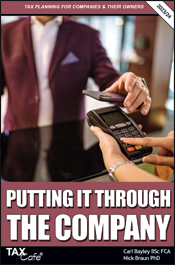Limited Company Tax Advantages Guide
The latest information can be found in our guide:
Putting It Through the Company
A limited company has many tax advantages. When considering the tax advantages of using a limited company (as opposed to trading in your own name) one of the key tax advantages is the ability to retain profits in the company, which are then only subject to corporation tax as opposed to income tax. Based on current rates and assuming the company is a small company with profits of less than £300,000 the difference is between someone paying corporation tax at 20% and income tax at 40%.
Retaining cash within the company can therefore represent a significant tax saving, but the ultimate problem is how to extract it. You could extract it annually as a dividend, but for many shareholders this would incur an additional 25% income tax charge.
A popular option is to retain cash in the company, which would be used to fund business investment or to provide the option of a large cash extraction in the future.
The current problem with retaining cash in the company is that on any disposal of the shares or on a liquidation, business asset taper relief status could be withdrawn. If you built up significant cash reserves in the business any disposal or transfer of shares in the company could be 'penalised' as the company may not qualify for full business asset taper relief on the shares.
This is because the taper relief provisions don't count a company as a trading company if it has substantial non-trading assets or income. ‘Substantial’ in this context is taken to mean at least 20% of net assets or income. The Revenue will consider any form of non-trading asset for this purpose, including property held in a company that is let (eg old business premises) as well as surplus cash not required for the purposes of the trade.
Therefore anyone looking to benefit from retaining profits within a company could, under the current taper relief provisions, suffer a tax penalty when they sell the shares.
Liquidating the company to extract cash
This was even more prominent when looking at liquidations. An extraction of cash from a company during the course of a winding up is generally treated as a capital distribution as opposed to an income distribution, and would therefore be subject to capital gains tax as opposed to income tax.
As such, if a large amount of cash was generated in a company, rather than extracting it annually and suffering an effective 25% income tax charge, one option would be to retain the cash in the company, liquidate it in the future and pay a capital distribution. If business asset taper relief applied, this would mean that you’d only be taxed at 10% on the extraction of the cash. This 15% tax saving on extraction can represent a significant sum.
The downside, though, is that, as above, the Revenue would consider whether the company truly was a trading company for the purposes of taper relief and could refuse business asset status for the shares (which could significantly increase the tax charge anywhere from 24% to 40%).
Where are we now?
The recent Pre-Budget report made an announcement that taper relief would be withdrawn for disposals after 6 April 2008. As from this date all capital gains will instead be subject to a flat CGT rate of 18%.
This means that there is no capital gains tax problem in retaining cash within a company. In the scenario above, the company could be liquidated and CGT would be payable on the extraction of cash as a capital distribution.
This, therefore, makes using a company potentially more attractive. Trading profits can be retained in the business, incurring a reduced rate of tax, and can then be extracted again at minimal tax cost in the future.
Downsides of using money box companies
There are a couple of points that you would need to watch out for:
- If the company were an investment company it would be subject to a different tax treatment. In particular, many of the other reliefs and tax benefits that are available to trading businesses would not be available to investment companies (eg limits on pension contributions, loss reliefs etc).
However, provided a trade is actually carried out in the company and it is simply a case of not extracting all of the trading profits, it is very unlikely that the company would be classed as an investment company.
- There is still the inheritance tax drawback. Shares in an unquoted trading company can qualify for up to 100% business property relief. However, this is not available if the company is an investment company and is reduced where the company holds assets not used for the purposes of trade. Cash that is retained in the business is likely to be viewed as a non-trading asset and, therefore, there could be a big drawback in terms of inheritance tax with a money box company.
However, aside from these, the new CGT rate removes one of the obstacles to retaining large cash balances within companies.
It should also be remembered that, as well as extracting the cash as a distribution on winding up it could be extracted as a simple dividend either after you're non-UK resident or while UK resident but within your basic rate tax band. In either of these cases, dividends can be received free of income tax.









